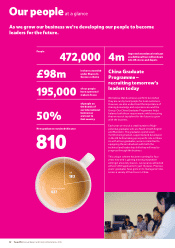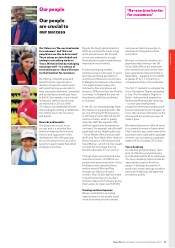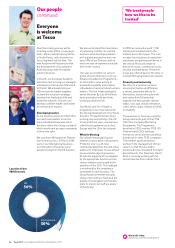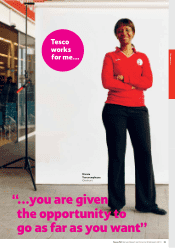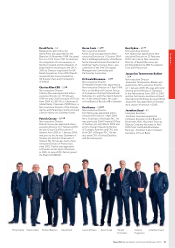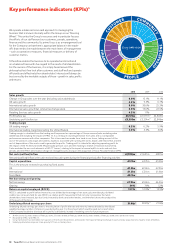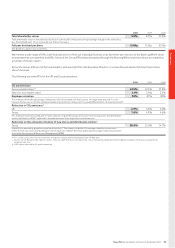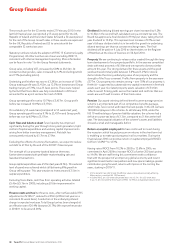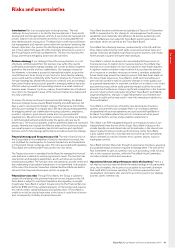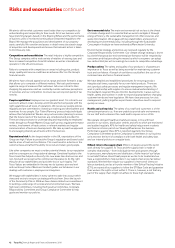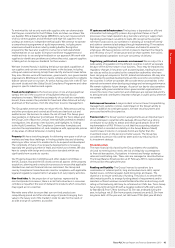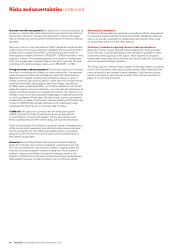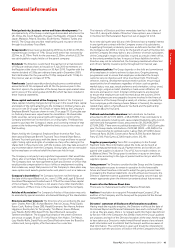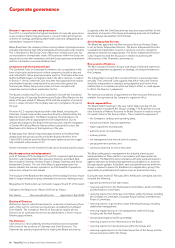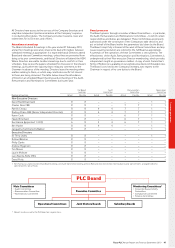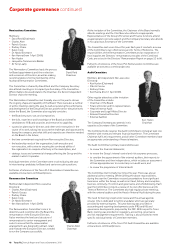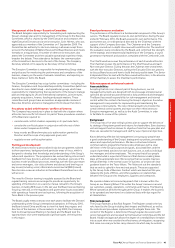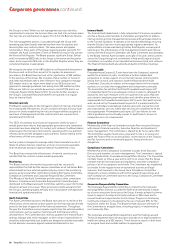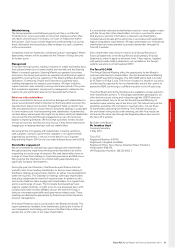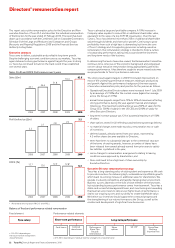Tesco 2010 Annual Report Download - page 44
Download and view the complete annual report
Please find page 44 of the 2010 Tesco annual report below. You can navigate through the pages in the report by either clicking on the pages listed below, or by using the keyword search tool below to find specific information within the annual report.42 Tesco PLC Annual Report and Financial Statements 2010
Risks and uncertainties continued
We aim to deliver what customers want better than our competitors by
understanding and responding to their needs. All of our business units
have stretching targets based on the Steering Wheel and the performance
of business units is monitored continually and reported regularly to the
Board. We manage the acquisition and development of our property
assets carefully. We consider and assess in detail every site at each stage
of acquisition and development and ensure that relevant action is taken
to minimise any risks.
Competition and consolidation The retail industry is highly competitive.
The Group competes with a wide variety of retailers of varying sizes and
faces increased competition from UK retailers as well as international
operators in the UK and overseas.
Failure to compete with competitors on areas including price, product
range, quality and service could have an adverse effect on the Group’s
financial results.
We aim to have a broad appeal on price, range and store format in a way
that allows us to compete in different markets. We track performance
against a range of measures that customers tell us are critical to their
shopping trip experience and we constantly monitor customer perceptions
of ourselves and our competitors to ensure we can respond quickly if we
need to.
People capabilities Employees are our greatest asset. It is critical to our
success to attract, retain, develop and motivate the best people with the
right capabilities at all levels of operations. We review our people policies
regularly and are committed to investing in training and development and
incentives for our people. Our ‘Talent Planning’ process helps individuals
achieve their full potential. We also carry out succession planning to ensure
that the future needs of the business are considered and provided for.
There are clear processes for understanding and responding to employees’
needs through our People Matters Group, staff surveys, regular performance
reviews, involvement of trade unions in relevant markets and regular
communication of business developments. We take a proactive approach
to encouraging diversity at all levels within the business.
Reputational risk As the largest retailer in the UK, expectations of the
Group are high. Failure to protect the Group’s reputation and brand could
lead to a loss of trust and confidence. This could result in a decline in the
customer base and affect the ability to recruit and retain good people.
Like other companies we must consider potential threats to our reputation
and the consequences of reputational damage. Emotional loyalty to the
Tesco brand has helped us diversify into new areas like retail services and
non-food and we recognise the commercial imperative to do the right
thing for all our stakeholders and avoid the loss of such loyalty. The
Tesco Values are embedded in the way we do business at every level
and our Group Code of Business Conduct guides our behaviour in our
dealings with customers, employees and suppliers.
We engage with stakeholders in every sphere to take into account their
views and we try to ensure our strategy reflects them. Since the launch
of the Community Plan in 2006 we have demonstrated our commitment
to tackling a wide range of societal and environmental issues. We have
high level committees, including the Executive Committee, Corporate
Responsibility Committee and Group Compliance Committee to help
guide and monitor our policies.
Environmental risks The main environmental risk we face is the threat
of climate change and it is essential that we work to mitigate it through
energy efficiency, the sustainable management of other resources and
waste minimisation. We engage with key stakeholders and experts in
developing environmental policy, including through the Sustainable
Consumption Institute we have endowed at Manchester University.
Environmental strategy and policies are reviewed regularly by the
Corporate Responsibility Committee. Our climate change strategy is driven
by a belief that proactive environmental performance will be rewarded by
consumers and that providing the means by which consumers can adopt
low-carbon lifestyles will increasingly be a route to competitive advantage.
Product safety The safety and quality of our products is of paramount
importance to Tesco as well as being essential for maintaining customer
trust and confidence. A breach of confidence could affect the size of our
customer base and hence financial results.
We have detailed and established procedures for ensuring product
integrity at all times, especially for our own-label products. There are
strict product safety processes and regular management reports. We
work in partnership with suppliers to ensure mutual understanding of
the standards required. We also monitor developments in areas such as
health, safety and nutrition in order to respond appropriately to changing
customer trends and new legislation. We have clear processes for crisis
management, pulling together expert teams should we need to respond
quickly on issues.
Health and safety risks The safety of our staff and customers is of the
utmost importance to us. If we are unable to provide safe environments
for our staff and customers this could lead to injuries or loss of life.
We operate stringent health and safety processes in line with best
practice in our stores, distribution centres and offices which are monitored
and audited regularly. KPIs for health and safety help prevent incidents
and form an intrinsic part of our Steering Wheel across the business.
Performance against these KPIs is reported quarterly. Our Group
Compliance Committee and the Compliance Committees in our business
units monitor the level of compliance with both health and safety laws
and our internal policies on a regular basis.
Ethical risks in the supply chain Millions of people around the world
work directly for suppliers to Tesco and the supply chain is made of
complex relationships – from individual farmers and growers through
to processors, manufacturers and distributors. At the heart of our Values
is our belief that we should treat people as we like to be treated and we
have a responsibility to help workers in our supply chain enjoy fair labour
standards. We therefore require our suppliers to meet strict criteria on
labour standards, and as a founder member of the Ethical Trading Initiative
(ETI ), we expect all our suppliers to follow the ETI Base Code and guarantee
their workers the rights set out within it. There is, however, a risk that any
part of the supply chain might not adhere to these high standards.


